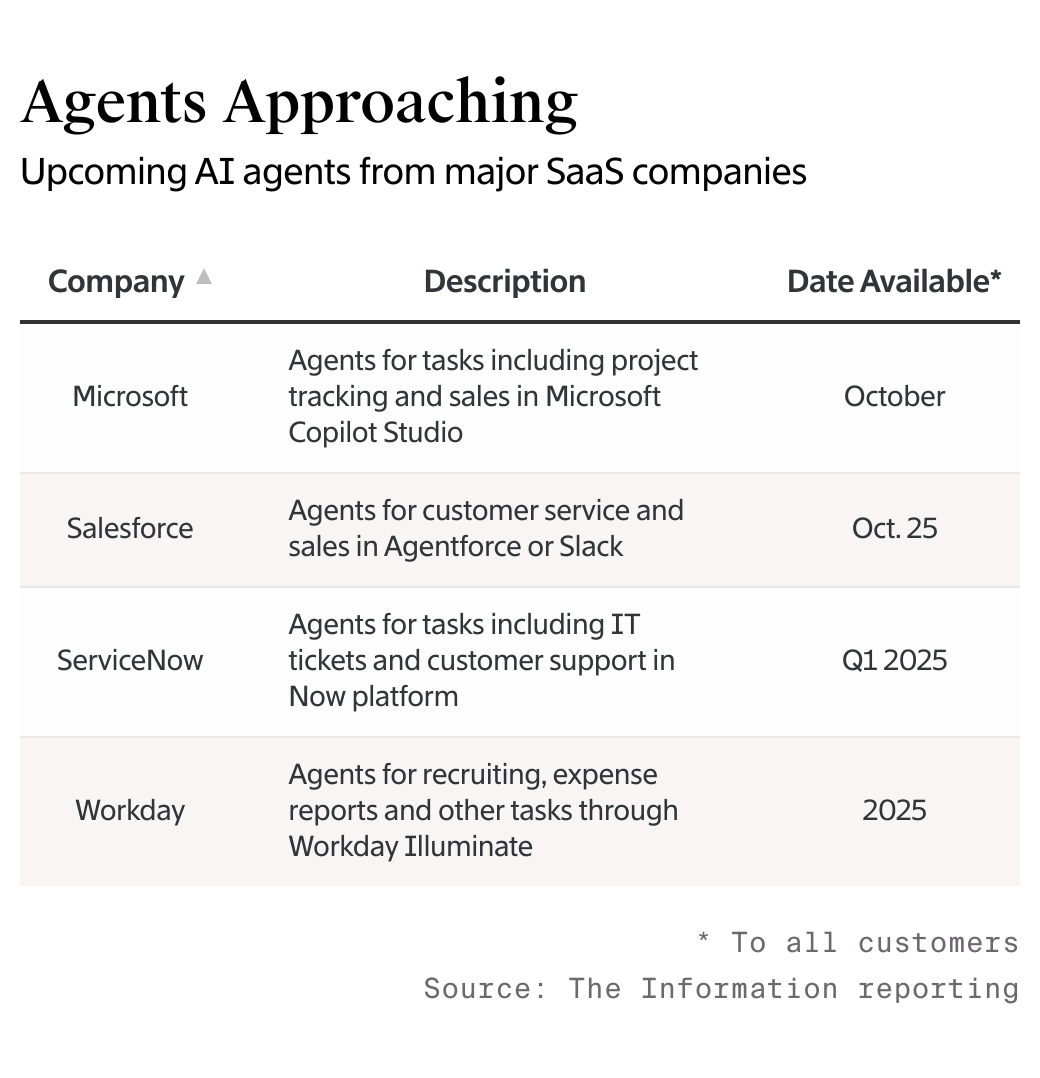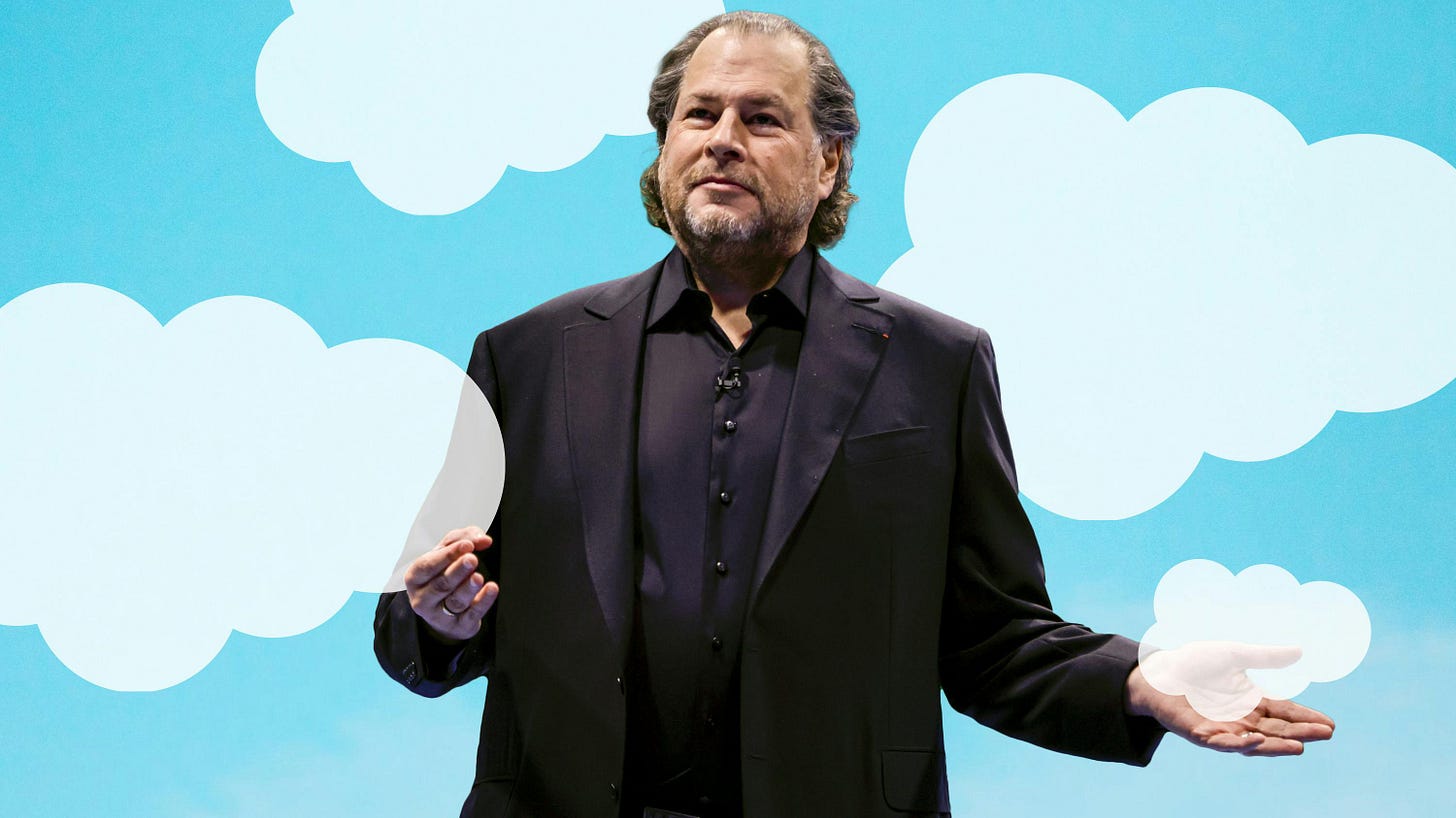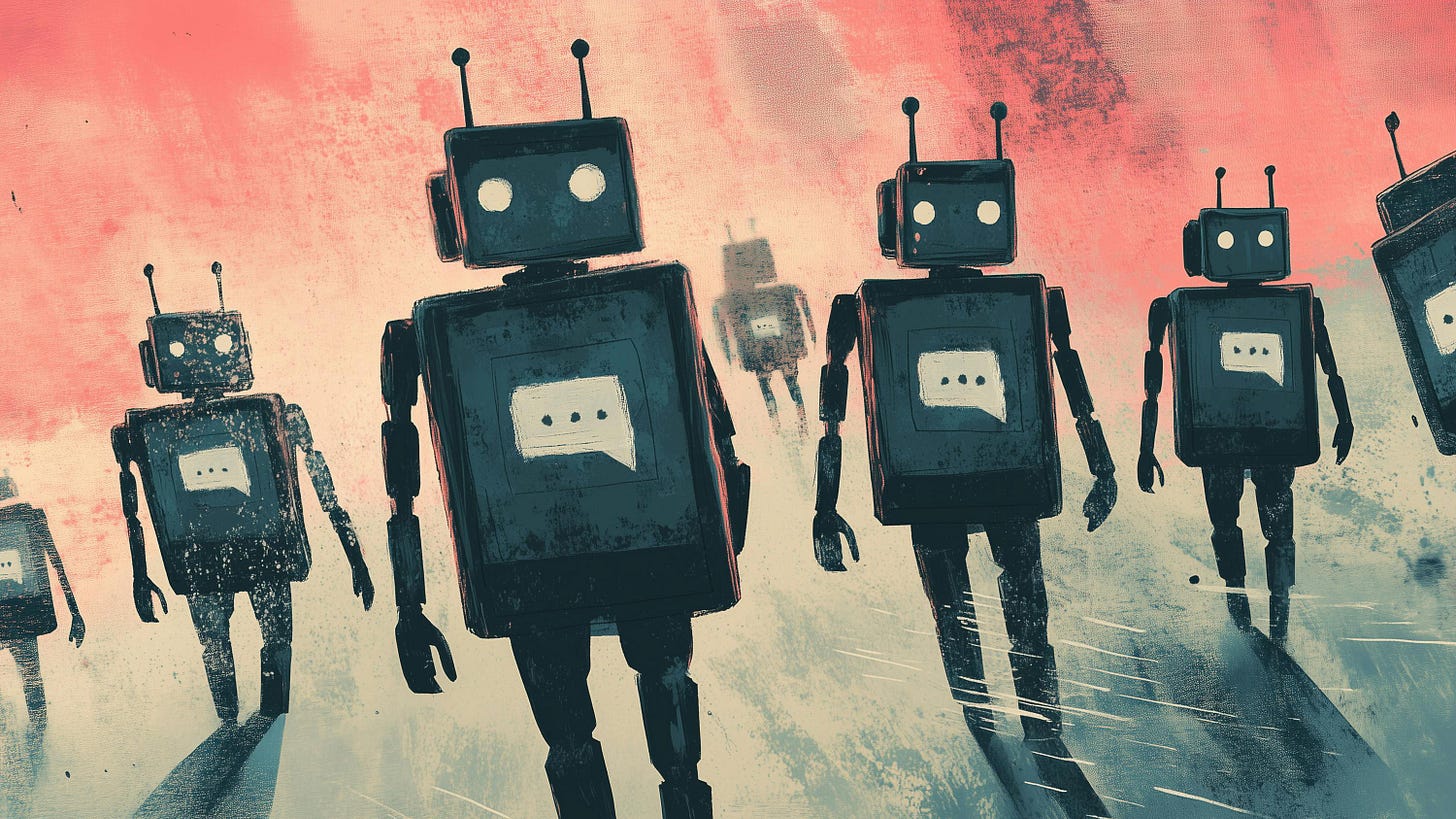AI: Salesforce selling AI Agents with force into the enterprise. RTZ #574
...competing aggressively against both 'AI add-on' and 'AI-native' companies
As AI software goes from chatbots to reasoning to agents and beyond to AGI (artificial general intelligence), a roadmap outlined by OpenAI a few months ago, the race is on to get AI ‘reasoning agents’ working for both consumers and businesses. It’s fitting that final levels after ‘Agents’, and ‘Innovators’, is ‘Organizations’ at Level 5. We’ve just passed Level 1 with Chatbots the past two years, and are entering Level 2 with ‘Ai Reasoning. OpenAI's recent o1 AI Reasoning product is a key example.
On the enterprise front, I’ve discussed how incumbent tech companies like Microsoft, Salesforce and others are adding AI ‘Agentic’ features as ‘AI add-ons’ for enterprises large and small. Microsoft with its AI Copilot efforts, and Salesforce with its ‘Agentforce’ line of AI products.
I’m outlining this because enterprise software, especially (SaaS, Software as a Service) is a multi-hundred billion dollar market, that will get increasingly transformed by LLM AI and related software in this AI Tech Wave to come. And we’re going to see ‘Native AI’ applications for enterprises as well from Startups, just as we’ll see the same on the consumer side of these markets.
And Wall Street is looking here first to gauge the utility of the ever-ramping AI capex investments by big tech into trillion dollar data centers over the coming decade. And as I’ve discussed many times before, the enterprise side typically develops at its own, sometimes slower pace, vs new technologies that race ahead at a faster pace.
It’s useful to look at this evolving landscape of ‘AI add-ons’ by incumbents vs ‘AI-native’ software in the enterprise CRM (customer relations management) software segment, where Salesforce (CRM), founded in 1999 by Marc Benioff is a leader. And is proactively leaning into AI Agents for the enterprise to both lead AI sales into enterprises, and defend these markets from incumbents and startups alike.
The Information’s piece “AI Is Marc Benioff’s Friend—and Foe”, provides a good look at this tug of war. Especially driven by a founder CEO, who is Exhibit A for the aphorism that ‘products are sold, not bought’:
“In the weeks after Salesforce unveiled Agentforce in September, its new artificial intelligence agent—a software tool that automates business tasks—CEO Marc Benioff had an aggressive demand for his sales teams. In all-hands sales meetings, he ordered that Agentforce must be part of every deal they complete with customers, said a person who works with Benioff.”
“And now, less than two months after Salesforce began selling the product, more than half of its roughly 15,000-member sales team has at least one Agentforce transaction in progress, Benioff said in a recent interview.”
Benioff, an ex-Oracle super-salesman, is a master at acquiring, fusing, blending new technologies over the decades, and selling it to enterprises large and small, around the world, as an integrated suite of products:
“Benioff is always quick to align his company with the latest technology trend. But he has jumped on AI agents, one of the latest software tools coming out of the generative AI revolution, with unusual alacrity—for good reason.”
“AI agents threaten to eventually replace Salesforce’s software applications—such as its sales and customer service software—and its business model of charging customers a subscription per employee. Benioff’s plan is to get there first.”
And he’s moving at rocket speed:
“In a sign of how quickly Salesforce is moving, the company unveiled a 2.0 version of Agentforce at a launch event on Tuesday, just three months after announcing the product. The new version comes with better reasoning capabilities that can help it give more nuanced answers to questions about investing or recruiting. The company is also planning to hire 2,000 people to sell its new AI software.”
“Agents are becoming the new apps,” said Salesforce’s AI chief, Adam Evans, as he demonstrated the new product for reporters, analysts and customers.”
“In September, Benioff made Dreamforce, the company’s annual customer conference, a coming-out party for Agentforce. And he hasn’t let up since then. Benioff said on an earnings call last month that Salesforce, which began selling Agentforce in late October, had closed around 200 deals so far and was working on thousands more, although these deals haven’t yet had a meaningful impact on its revenue.”
And he’s determined to compete with old competitors like Microsoft, as well as new competitors in the enterprise space like ‘AI-native’ company OpenAI:
“As he has pressed the case for Agentforce, Benioff has also repeatedly criticized Microsoft and its OpenAI-powered chatbot, Copilot, in recent months, claiming it produces inaccurate responses to questions and is prone to exposing sensitive corporate data, among other shortcomings. Yet Salesforce uses OpenAI models in Agentforce and other products. When OpenAI’s ChatGPT service experienced an outage earlier this month, Agentforce also went dark.”
And he’s competing aggressively with Sierra, an ‘AI-native’ startup founded and led by Bret Taylor, a former Salesforce co-CEO with Benioff, and board chair of OpenAI in its current incarnation:
“Benioff is trying to make up for lost time. While Salesforce has been selling AI-powered software since it launched its Einstein product in 2016, its AI products have fallen behind those from some newer startups. They are unable to perform as many actions as newer offerings—particularly in areas around customer service.”
“That has caused Salesforce customers like mattress maker Casper to buy AI agent software from Sierra, a startup co-founded by former Salesforce co-CEO Bret Taylor, according to people with direct knowledge of those relationships. Casper’s decision came despite Salesforce’s efforts to dissuade the company.”
The whole piece is worth reading to understand the hand to hand combat by these senior executives for this AI enterprise market, as well as how these products are both ‘sold’ and ‘bought’ by enterprises over time.
Marc Benioff here is pressing its aggressive focus on rolling out AI Agents in the enterprise, leveraging over 25 years of its CRM software suites in the enterprise.
After launching Agentforce 1.0 in October, with over a 1000 customer deals closed thus far, Salesforce is already on Agentforce 2.0. It’s integrated into its CRM product suite, able to deploy agents directly in Slack. The release also expands AI reasoning capabilities within its Atlas Reasoning Engine.
The update also enhances the suite’s main user interface for accessing and utilizing GenAI capabilities in enterprise environments. The idea is to enable augmentation of enterprise users in everyday activities.
The key Benioff message is that Salesforce is firmly participating in the shift towards Agentic Computing, and highlighting its leadership position within the space.
Also emphasized is Salesforce's ability to build on its quarter century of enterprise customers’ workflows, data, core business logic, and corporate security protocols. For good measure, the company highlighted that the pace continues with Agentforce 3.0 in May 2025.
Salesforce is making sure the market knows its lighting up the enterprise agentic skyline, just like its iconic office tower in San Francisco.
It all becomes a bit clearer, that while AI technologies scale at exponential rates in this AI Tech Wave, sales to businesses may sometimes can take a bit more time. But it’s not going to lack aggressive efforts to develop and sell these agentic capabilities into the marketplace.
And for the most part, both incumbents and startups are making headway for now. Stay tuned.
(NOTE: The discussions here are for information purposes only, and not meant as investment advice at any time. Thanks for joining us here)










